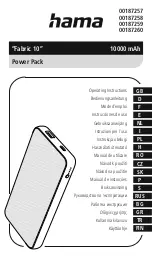
11
REV. 6/17
GB2628 INSTALLATION TOOL
Providing all maintenance conditions have been met, follow this systematic approach to diagnosis.
1. NO OPERATION WHEN ACTUATOR IS DEPRESSED.
a.) Check Powerunit power source.
b.) Control cord may be loose or damaged.
c.) Faulty electric actuator. Replace.
d.) Check hydraulic couplings; repair or replace.
2. SLOW OR PARTIAL OPERATION WHEN ACTUATOR IS DEPRESSED.
a.) Low hydraulic pressure. Check powerunit, adjust.
b.) Glyd Ring Assy (262813) on the piston assy (262806) could be worn or damaged. Replace.
c.) Excessive wear or scoring on moving parts. Check and replace faulty parts.
3. TOOL OPERATES IN REVERSE
a.) Tool stops in back position. Hydraulic hoses are reversed. Correct.
4. HYDRAULIC OIL OVERHEATS
a.) Powerunit motor rotation reversed. Electrical connections reversed. See powerunit instruction manual.
b.) Restrictions in either hydraulic lines, hoses or couplings. Check and tighten, clean or replace. (
See hydraulic thread preparation pg.10).
5. OIL LEAKAGE
a.) Hydraulic oil leaks from connections. Tighten threaded connections.
b.) Oil leaks from tool. Determine source of leak and replace worn or defective o'rings and back-up rings. (
See hydraulic thread
preparation pg.10)
6. PINTAIL GROOVES STRIPPED DURING PULL STROKE
a.) Nose Assembly must be pushed onto fastener fully.
b.) Chips may have collected in chuck jaws. Disassemble nose assembly, clean jaws in mineral spirits using a sharp pointed object.
c.) Chuck jaws may be worn or damaged. Replace.
d.) Pintail too short for jaws to properly grip. Select proper grip length fastener.
e.) Excessive gap between sheets. Reduce gap before attempting to install fastener.
7. NOSE ASSEMBLY WON'T ACCEPT FASTENER PINTAIL
a.) Spent fastener stem may be jammed in pulling head. Disassemble and check for worn or broken parts in nose assembly.
Replace defective parts and clean before reassembling.
b.) Verify Tool and Nose Assembly are correct for fastener.
TROUBLESHOOTING






































